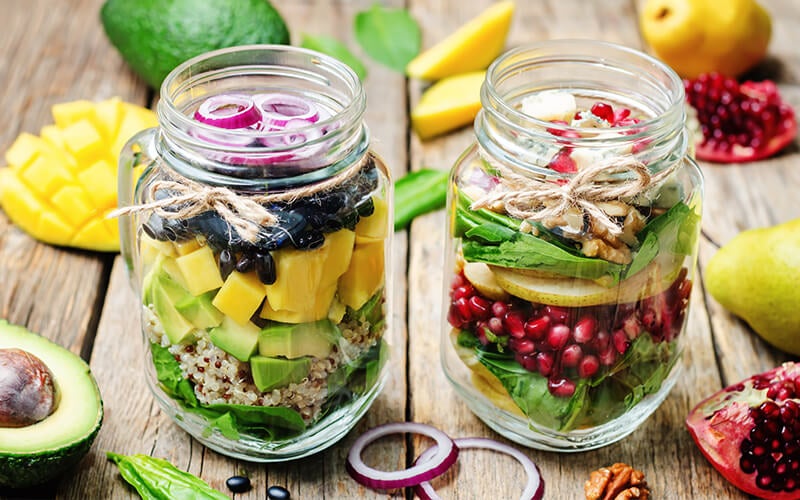Is yo-yo dieting worth the effort? 6 ways to keep the weight off after all your hard work
 ©Cavan Images
©Cavan Images
It’s not possible to avoid the yo-yo effect completely. The art is to keep it as small as possible. We give tips and background knowledge on how you can (almost) avoid the yoyo effect and what to look out for during a diet.
What is yo-yo dieting?
If after a diet, you find yourself gaining weight to your previous level or higher, chances are you’re experiencing the yo-yo effect, also called weight cycling.
This is usually the result of crash dieting in which you undershot your calorie needs. If you reduce your daily calorie intake too far, weight gain is inevitable. Watch out if your daily calorie intake is significantly below your actual calorie needs or even below your required basal metabolic rate for an extended period.
Think twice before setting your sights on yo-yo diets as a New Year’s resolution!
Looking for healthy weight loss without the yo-yo dieting? We love to hear that – and we’re here for you! Our free Body Check is a perfect first step. Calculate your BMI, define your goals for your lifestyle changes, and get individually tailored nutrition and training tips.
What causes weight cycling?
A reduction diet puts your body into a state of emergency in which it draws on your energy reserves. In other words, it’s not only drawing on carbs, but also protein reserves: meaning you may experience muscle loss along with that drop in belly fat.
Less muscle also means that your body uses fewer calories, and your basal metabolic rate decreases. In order to maintain your weight or continue to lose weight, you will have to consume significantly fewer calories than you did beforehand.
It’s not easy to return to your original diets after yo-yo dieting. Without careful reverse dieting, your body will go straight to storing the excess as body fat.
Much as we may hate it, the mechanism behind the rebound effect is actually an important function of the human body to protect itself from conditions of starvation. Your system adapts to the environment you’re putting it in, your metabolism slows down, and you use less energy to try and keep yourself going until you can restock your reserves.
In order to keep your weight loss after dieting, or to reduce rebound as much as possible, pay attention to your diet, exercise, stress, and recovery.
Avoiding weight cycling: The golden rules
The first yo-yo dieting rule
Pay attention to your caloric needs. Never undershoot your basal metabolic rate. If you’re not sure how many kcal you should consume, calculate your BMR and your daily calorie requirements to reach your weight loss goals.
The second yo-yo dieting rule
Keep it going. Keeping a nutrition diary helps you reflect on your eating habits. This helps you keep an eye on your dietary and caloric needs and adjust them regularly for your health.

3 basics to counter weight cycling
Diet
For a weight change without resorting to yo-yo dieting, we recommend a daily caloric deficit of 300-500 kcal under your total metabolic rate.
Although you may see quick weight loss from a severe calorie restriction, it’s not good for your health and may not help you lose weight in the long term. Weight gain will quickly undo all the joy of quick success.
Exercise & Sports
If you’ve been exercising several times a week and then suddenly stop, you run the risk of a rebound due to your lower calorie expenditure. Even if you’re not eating any more than you were before, it can occur simply through less exercise.
To avoid this risk, don’t abruptly stop exercising once you’ve reached your weight loss goal. Keep at it or reduce your workouts gradually, adjusting your intake to your new health needs.
Stress & Recovery
Stress has a bigger influence on body weight than you think. Under stress, the body produces cortisol, which causes more energy to be extracted from fat cells. And those need to be refilled. What’s the quickest source? Sugar. That’s why you reach for the sweets when you’re feeling stressed.
You might not be giving your body enough recovery if you aren’t sleeping enough or taking enough breaks between workouts. Insufficient recovery can cause hormonal imbalance and high cortisol levels.
Our best tips to avoid the yo-yo effect
1. Avoid empty calories & increase protein intake
For best health, focus on balanced nutrition. Cut out empty energy, such as white bread, sodas, or convenience foods.
Make sure you get enough protein in your meal plan. Protein prevents your muscles from being depleted and keeps you full longer than carbohydrates or fats, which makes losing weight easier.
If you’re finding it hard to cover your protein needs, we have just the thing for you: our high-quality protein fitness food.
2. Get enough exercise
Get a healthy amount of regular exercise with appropriate breaks. Regular workouts keep your BMR higher to help you lose weight and boost your metabolism.
Try for 3 to 4 sessions a week. And we can help you create a workout plan. We even have free workouts for you! Adapt the length and intensity of the training to your own progress.
Look for little ways to get more active in your everyday life. Taking the stairs instead of the elevator can make a big difference. If you take public transportation, get out one stop early and walk the rest of the way. Take your bike to the office instead of the train or car.
3. Reduce stress & plan recovery periods
Reducing stress is not always easy, but it’s a must if you want to be healthy and fit. Regular movement and exercise is a great place to start, because it adds some balance to your life. And getting enough sleep is crucial. Allow yourself 7 to 8 hours of restful sleep every day!
In between, simply take a deep breath and get some the fresh air. Take the breaks you need. Even small periods of time when you are just for yourself or doing something you enjoy will reduce stress considerably.
Tips for losing weight without weight cycling
Change your meal plans for the long term. Keep your calorie deficit moderate: between 300 and 500 kcal a day. At the same time, increase your body’s calorie expenditure by exercising more and getting more active in your daily life.
Summary
Even if your daily calorie intake is moderately reduced over a long period of time, your metabolism will adjust and your body will require fewer calories each day.
Bottom line? The key to minimizing weight cycling is to find the right balance between your diet, exercise, and recovery.
Sources for this article
We at foodspring use only high-quality sources, including peer-reviewed studies, to support the facts within our articles. Read our editorial policy to learn more about how we fact-check and keep our content accurate, reliable, and trustworthy.

































